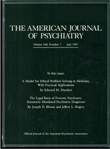Overview: clinical and physiological comparison of meditation with other self-control strategies
Abstract
In 1977 the American Psychiatric Association called for a critical examination of the clinical effectiveness of meditation. The author provides a review of the literature bearing on clinical and physiological comparisons of meditation with other self-control strategies. He begins by providing a definition of mediation and then cites the literature comparing mediation with such self-regulation strategies as biofeedback, hypnosis, and progressive relaxation. He pays particular attention to the "uniqueness" of mediation as a clinical intervention strategy a well as the adverse effects of meditation. Finally, he offers suggestions and guidelines for future research.
Access content
To read the fulltext, please use one of the options below to sign in or purchase access.- Personal login
- Institutional Login
- Sign in via OpenAthens
- Register for access
-
Please login/register if you wish to pair your device and check access availability.
Not a subscriber?
PsychiatryOnline subscription options offer access to the DSM-5 library, books, journals, CME, and patient resources. This all-in-one virtual library provides psychiatrists and mental health professionals with key resources for diagnosis, treatment, research, and professional development.
Need more help? PsychiatryOnline Customer Service may be reached by emailing [email protected] or by calling 800-368-5777 (in the U.S.) or 703-907-7322 (outside the U.S.).



